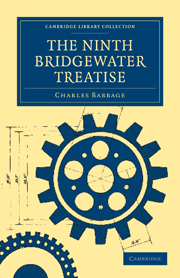Book contents
- Frontmatter
- Contents
- Preface
- Title in the Series
- CHAPTER I Nature of the Argument
- CHAPTER II Argument in favour of Design from the changing of Laws in Natural Events
- CHAPTER III Argument to show that the Doctrines in the preceding Chapter do not lead to Fatalism
- CHAPTER IV On the Account of the Creation, in the First Chapter of Genesis
- CHAPTER V Further View of the same Subject
- CHAPTER VI Of the Desire of Immortality
- CHAPTER VII On Time
- CHAPTER VIII Argument from Laws intermitting—on the Nature of Miracles
- CHAPTER IX On the permanent Impression of our Words and Actions on the Globe we inhabit
- CHAPTER X On Hume's Argument against Miracles
- CHAPTER XI À priori Argument in favour of the Occurrence of Miracles
- CHAPTER XII Thoughts on the Nature of Future Punishments
- CHAPTER XIII Reflections on Free Will
- CHAPTER XIV Thoughts on the Origin of Evil
- CONCLUSION
- APPENDIX
- CORRECTIONS
CHAPTER I - Nature of the Argument
Published online by Cambridge University Press: 05 October 2010
- Frontmatter
- Contents
- Preface
- Title in the Series
- CHAPTER I Nature of the Argument
- CHAPTER II Argument in favour of Design from the changing of Laws in Natural Events
- CHAPTER III Argument to show that the Doctrines in the preceding Chapter do not lead to Fatalism
- CHAPTER IV On the Account of the Creation, in the First Chapter of Genesis
- CHAPTER V Further View of the same Subject
- CHAPTER VI Of the Desire of Immortality
- CHAPTER VII On Time
- CHAPTER VIII Argument from Laws intermitting—on the Nature of Miracles
- CHAPTER IX On the permanent Impression of our Words and Actions on the Globe we inhabit
- CHAPTER X On Hume's Argument against Miracles
- CHAPTER XI À priori Argument in favour of the Occurrence of Miracles
- CHAPTER XII Thoughts on the Nature of Future Punishments
- CHAPTER XIII Reflections on Free Will
- CHAPTER XIV Thoughts on the Origin of Evil
- CONCLUSION
- APPENDIX
- CORRECTIONS
Summary
The notions we acquire of contrivance and design arise from comparing our observations on the works of other beings with the intentions of which we are conscious in our own undertakings. We take the highest and best of human faculties, and, exalting them in our imagination to an unlimited extent, endeavour to attain an imperfect conception of that Infinite Power which created every thing around us. In pursuing this course, it is evident that we are liable to impress upon the notion of Deity thus shadowed out, many traces of those imperfections in our own limited faculties which are best known to those who have most deeply cultivated them. It is also evident that all those discoveries which arm human reason with new power, and all additions to our acquaintance with the material world, must from time to time render a revision of that notion necessary. The present seems to be a fit occasion for such a revision.
Many excellent and religious persons not deeply versed in what they mistakenly call “human knowledge,” but which is in truth the interpretation of those laws that God himself has impressed on his creation, have endeavoured to discover proofs of design in a multitude of apparent adaptations of means to ends, and have represented the Deity as perpetually interfering, to alter for a time the laws he had previously ordained; thus by implication denying to him the possession of that foresight which is the highest attribute of omnipotence.
- Type
- Chapter
- Information
- The Ninth Bridgewater Treatise , pp. 23 - 29Publisher: Cambridge University PressPrint publication year: 2009First published in: 1837



